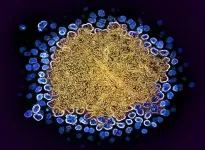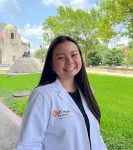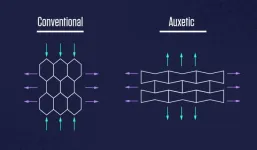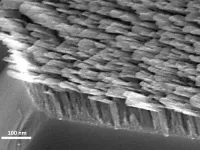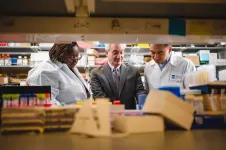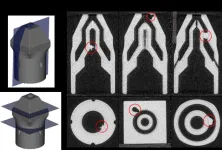(Press-News.org) Feelings of loneliness and social isolation during the pandemic left many people confused about the order of events and struggling to remember what day of the week it was, a new study reveals.
The research, from the University of York, looked at the psychological impact of the pandemic, which spread to the UK in March 2020, through the lens of disorientation.
The researchers asked more than 3,300 French participants nearly 60 questions analysing the psychological effects of lockdowns. The survey took place during an acute phase of restrictions when there was a lockdown followed by a strict curfew.
The findings reveal both social and temporal disorientation — a sensation of disarray in social interactions and sense of time – was common.
Many participants in the study described feeling out of place and unsure how to behave in social situations.They also reported experiencing a blurring of time and feeling adrift as they struggled to keep track of events prior to the pandemic as well as what day of the week it was. The difficulty also extended onwards in time. Participants found it harder to imagine what lay ahead, and they felt more anxious and less in control of their future.
The researchers found that people who felt disconnected socially were highly likely to also experience temporal disorientation. Their analysis of the study data suggested a causal relationship between the two, with social isolation leading to disruptions in the experience of time.
Dr Pablo Fernandez Velasco, a British Academy postdoctoral fellow at the University of York, and the lead author of the study, said: “We found that social disorientation was a strong predictor of temporal disorientation and it looks likely that there was a causal relationship between the two. Feeling lonely and isolated from others seems to warp our perception of time, with a sense of feeling lost and confused spanning the past, present and future.
“Many people in our society, across all groups and demographics, suffer from loneliness. The findings of our study reinforce the importance for public authorities to address the compounding effect of feeling isolated both during crises and in day to day life.”
The researchers found that young people under 25 were the age group most affected by feelings of disorientation.
The researchers suggest their findings point to a new phenomenon which they call “temporal rupture” which is like a fault line in our minds separating the “before” and “after” of the pandemic.
Dr Fernandez Velasco added: “Our study shows that the sense of a rift separating time before and time after the pandemic was a common experience during the Covid-19 crisis.
“The larger the experienced rift between pre-pandemic and pandemic times, the more disorientated people felt.
“The personal accounts collected in our study help advance the understanding of the potential impacts of feelings of loneliness and isolation via the extraordinary experiences of the pandemic.”
Social and temporal disorientation during the Covid-19 pandemic: An analysis of 3306 responses to a quantitative questionnaire is published in the British Journal of Psychology
END
Lost in lockdown: Study reveals feeling isolated from others can warp our perception of time
Feelings of loneliness and social isolation during the pandemic left many people confused about the order of events and struggling to remember what day of the week it was, a new study reveals
2024-06-04
ELSE PRESS RELEASES FROM THIS DATE:
U.S. clinical trials begin for twice-yearly HIV prevention injection
2024-06-04
WHAT:
Two clinical trials have launched to examine a novel long-acting form of HIV pre-exposure prophylaxis (PrEP) in cisgender women and people who inject drugs. The mid-stage studies will assess the safety, acceptability, and pharmacokinetic (how a drug moves through the body) of lenacapavir, an antiretroviral drug administered by injection every six months. The studies are sponsored and funded by Gilead Sciences, Inc., and implemented through the HIV Prevention Trails Network (HPTN). The HPTN is supported by grants from the National Institute of Allergy and Infectious Diseases (NIAID), part of the National Institutes of ...
Combining pest treatments may be key to helping honey bees survive the winter
2024-06-04
UNIVERSITY PARK, Pa. — Winters can be tough on managed honey bee colonies, with beekeepers in the United States reporting that one-third of their colonies die each winter. A new study by Penn State researchers has found that using not one but multiple pest treatments may help bees make it to spring.
The researchers found that beekeepers who used a combination of treatments for Varroa mites — tiny parasites that can weaken and spread diseases to honey bees — had higher winter colony survival than those who used only one type of treatment. The findings were published in the Journal of Insect Science.
Additionally, ...
UTA program helps students achieve medical school dreams
2024-06-04
Getting into graduate school to become a doctor or a dentist is difficult. By some estimates, only about 37% to 42% of students who apply to medical or dental school are accepted.
To help pre-medical and -dental students achieve their dreams, UT Arlington created a program called the Health Professions Advisory Committee (HPAC). The odds of graduate school admission for students participating in HPAC is significantly higher than average, with an estimated 85% succeeding.
This is just one of several UT Arlington initiatives helping alleviate ...
Rocky shores of Pacific Northwest show low resilience to changes in climate
2024-06-04
CORVALLIS, Ore. – A 15-year period ending in 2020 that included a marine heat wave and a sea star wasting disease epidemic saw major changes in the groups of organisms that live along the rocky shores of the Pacific Northwest.
The study by Oregon State University scientists, involving four capes in Oregon and California, suggests these communities of species may have low resilience to climate change. Findings were published Monday in Nature Ecology & Evolution and.
Researchers learned that ...
A new way of designing auxetic materials
2024-06-04
Imagine pulling on the long ends of a rectangular piece of rubber.
It should become narrower and thinner.
But what if, instead, it got wider and fatter?
Now, push in on those same ends. What if the rubber became narrower and thinner?
Such common-sense-defying materials do exist. They’re called auxetics, and they have a raft of unique properties that make them well-suited for sneaker insoles, bomb-resilient buildings, car bumpers and clothing.
Despite this great potential, auxetic products have been slow to market. Researchers at the National Institute of Standards and Technology (NIST) and the University of Chicago hope to change this.
In a new study published ...
Neurocognitively-defined subtypes in bipolar disorder: a path to more personalized treatments
2024-06-04
The Brain & Behavior Research Foundation (BBRF) is hosting a free webinar, “Neurocognitively-Defined Subtypes in Bipolar Disorder: A Path to More Personalized Treatments” on Tuesday, June 11, 2024, at 2:00 pm ET. The presenter, Katherine E. Burdick, PhD, is the Jonathan F. Borus, MD Distinguished Chair in Psychiatry and the Vice Chair for Research in Psychiatry at Brigham and Women’s Hospital. She is the Director of the Mood and Psychosis Research Program at BWH and a Professor at Harvard Medical ...
Shining a light on molecules: L-shaped metamaterials can control light direction
2024-06-04
UNIVERSITY PARK, Pa. — Polarized light waves spin clockwise or counterclockwise as they travel, with one direction behaving differently than the other as it interacts with molecules. This directionality, called chirality or handedness, could provide a way to identify and sort specific molecules for use in biomedicine applications, but researchers have had limited control over the direction of the waves — until now.
Using metamaterials, a team of electrical engineering researchers from Penn State and the University of Nebraska-Lincoln ...
Wistar scientists develop novel antibody treatment for kidney cancer
2024-06-04
PHILADELPHIA — (June 04, 2024) — Advanced clear cell renal cell carcinoma (ccRCC) is a deadly form of kidney cancer with few treatment options; even with new immunotherapies, only around one in 10 patients ultimately survive.
Antibody therapies called bispecific T cell engagers (BTEs) have emerged as effective treatments for some blood cancers but have been more difficult to develop for solid tumors. While clinically successful, first-generation BTEs suffer a short half-life. Now, Wistar scientists have built upon BTE technology to develop new and improved recombinant and synthetic ...
Virus that causes COVID-19 can remain in sperm for 110 days after infection
2024-06-04
Researchers at the University of São Paulo (USP) in Brazil have shown for the first time that SARS-CoV-2, the virus that causes COVID-19, can remain in the sperm of patients for up to 90 days after hospital discharge and up to 110 days after the initial infection, reducing semen quality. The study is reported in an article published in the journal Andrology. The authors suggest that people who plan to have children should observe a period of “quarantine” after recovering ...
Researchers use machine learning to detect defects in additive manufacturing
2024-06-04
Researchers at the University of Illinois Urbana-Champaign have developed a new method for detecting defects in additively manufactured components.
One of the most important tasks in any factory is to determine whether a manufactured component is free of defects. In additive manufacturing (3D printing), it can be particularly challenging to find defects, because additive manufacturing can make components that have complex three-dimensional shapes and important internal features that are not easily observed.
The novel technology uses deep machine ...
LAST 30 PRESS RELEASES:
ASU researchers to lead AAAS panel on water insecurity in the United States
ASU professor Anne Stone to present at AAAS Conference in Phoenix on ancient origins of modern disease
Proposals for exploring viruses and skin as the next experimental quantum frontiers share US$30,000 science award
ASU researchers showcase scalable tech solutions for older adults living alone with cognitive decline at AAAS 2026
Scientists identify smooth regional trends in fruit fly survival strategies
Antipathy toward snakes? Your parents likely talked you into that at an early age
Sylvester Cancer Tip Sheet for Feb. 2026
Online exposure to medical misinformation concentrated among older adults
Telehealth improves access to genetic services for adult survivors of childhood cancers
Outdated mortality benchmarks risk missing early signs of famine and delay recognizing mass starvation
Newly discovered bacterium converts carbon dioxide into chemicals using electricity
Flipping and reversing mini-proteins could improve disease treatment
Scientists reveal major hidden source of atmospheric nitrogen pollution in fragile lake basin
Biochar emerges as a powerful tool for soil carbon neutrality and climate mitigation
Tiny cell messengers show big promise for safer protein and gene delivery
AMS releases statement regarding the decision to rescind EPA’s 2009 Endangerment Finding
Parents’ alcohol and drug use influences their children’s consumption, research shows
Modular assembly of chiral nitrogen-bridged rings achieved by palladium-catalyzed diastereoselective and enantioselective cascade cyclization reactions
Promoting civic engagement
AMS Science Preview: Hurricane slowdown, school snow days
Deforestation in the Amazon raises the surface temperature by 3 °C during the dry season
Model more accurately maps the impact of frost on corn crops
How did humans develop sharp vision? Lab-grown retinas show likely answer
Sour grapes? Taste, experience of sour foods depends on individual consumer
At AAAS, professor Krystal Tsosie argues the future of science must be Indigenous-led
From the lab to the living room: Decoding Parkinson’s patients movements in the real world
Research advances in porous materials, as highlighted in the 2025 Nobel Prize in Chemistry
Sally C. Morton, executive vice president of ASU Knowledge Enterprise, presents a bold and practical framework for moving research from discovery to real-world impact
Biochemical parameters in patients with diabetic nephropathy versus individuals with diabetes alone, non-diabetic nephropathy, and healthy controls
Muscular strength and mortality in women ages 63 to 99
[Press-News.org] Lost in lockdown: Study reveals feeling isolated from others can warp our perception of timeFeelings of loneliness and social isolation during the pandemic left many people confused about the order of events and struggling to remember what day of the week it was, a new study reveals
